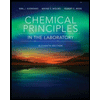Consider an acetate buffer system made up of acetic acid and sodium acetate, initially at the same pH as its pka (4.76). When small amount of base is added to this buffer which of the following reactions is most likely to occur which will prevent increase in pH of the buffer? O a. CH3COOH + N2OH - CH3C00+ H20 Ob. None of the above OC CH3CO0" + HCI CH3COOH + Cr Od CHạCO0 + NAOH - CH3COOH + Na* Oe. CH3COOH + HCI - CH3CO0 + H20
Consider an acetate buffer system made up of acetic acid and sodium acetate, initially at the same pH as its pka (4.76). When small amount of base is added to this buffer which of the following reactions is most likely to occur which will prevent increase in pH of the buffer? O a. CH3COOH + N2OH - CH3C00+ H20 Ob. None of the above OC CH3CO0" + HCI CH3COOH + Cr Od CHạCO0 + NAOH - CH3COOH + Na* Oe. CH3COOH + HCI - CH3CO0 + H20
Chemistry: The Molecular Science
5th Edition
ISBN:9781285199047
Author:John W. Moore, Conrad L. Stanitski
Publisher:John W. Moore, Conrad L. Stanitski
Chapter15: Additional Aqueous Equilibria
Section: Chapter Questions
Problem 108QRT
Related questions
Question
Question 5

Transcribed Image Text:Remaining Time: 1 hour, 19 minutes, 11 seconds.
Question Completion Status:
11
13
14
15
16
17
18
19
20
21
22
23
24
25
26
27
28
29
30
31
32
33
34
2
3
4
6
8
6.
10
12
QUESTION 5
Consider an acetate buffer system made up of acetic acid and sodium acetate, initially at the same pH as its pka (4.76). When small amount of base is added to this buffer which of the following reactions is most likely to occur
which will prevent increase in pH of the buffer?
O a. CH3COOH + N2OH - CH3CO0 + H20
O b. None of the above
OC CH3CO0 + HCI
CH3COOH + Cr
Od.
CH3CO0 + NaOH -
CH3COOH + Na*
O e. CH3COOH + HCI
е.
CH3CO0
+ H20
QUESTION 6
Which of the following statements about buffers is (are) true?
(a) the pH of a buffered solution remains unchanged no matter how much acid or base is
added to the solution.
O (b) the strongest buffers are made up of strong acids and strong bases
(c) a buffer composed of a weak acid of pKa = 5 is a better buffer at pH 4 than at pH 6.00
O (d) when pH = pKa, the weak acid and conjugate base concentrations in a buffer are equal
O (e) both (b) and (d)
QUESTION 7
Which of the following molecules cannot exhibit intermolecular (among themselves) hydrogen bonding?
O ammonia
O hydrogen sulfide
O flourine gas
Click Save and Submit to save and submit. Click Save All Answers to save all answers.
Save All AnS
Expert Solution
This question has been solved!
Explore an expertly crafted, step-by-step solution for a thorough understanding of key concepts.
This is a popular solution!
Trending now
This is a popular solution!
Step by step
Solved in 2 steps with 2 images

Recommended textbooks for you

Chemistry: The Molecular Science
Chemistry
ISBN:
9781285199047
Author:
John W. Moore, Conrad L. Stanitski
Publisher:
Cengage Learning

Principles of Modern Chemistry
Chemistry
ISBN:
9781305079113
Author:
David W. Oxtoby, H. Pat Gillis, Laurie J. Butler
Publisher:
Cengage Learning

General, Organic, and Biological Chemistry
Chemistry
ISBN:
9781285853918
Author:
H. Stephen Stoker
Publisher:
Cengage Learning

Chemistry: The Molecular Science
Chemistry
ISBN:
9781285199047
Author:
John W. Moore, Conrad L. Stanitski
Publisher:
Cengage Learning

Principles of Modern Chemistry
Chemistry
ISBN:
9781305079113
Author:
David W. Oxtoby, H. Pat Gillis, Laurie J. Butler
Publisher:
Cengage Learning

General, Organic, and Biological Chemistry
Chemistry
ISBN:
9781285853918
Author:
H. Stephen Stoker
Publisher:
Cengage Learning

General Chemistry - Standalone book (MindTap Cour…
Chemistry
ISBN:
9781305580343
Author:
Steven D. Gammon, Ebbing, Darrell Ebbing, Steven D., Darrell; Gammon, Darrell Ebbing; Steven D. Gammon, Darrell D.; Gammon, Ebbing; Steven D. Gammon; Darrell
Publisher:
Cengage Learning

Chemical Principles in the Laboratory
Chemistry
ISBN:
9781305264434
Author:
Emil Slowinski, Wayne C. Wolsey, Robert Rossi
Publisher:
Brooks Cole

Chemistry & Chemical Reactivity
Chemistry
ISBN:
9781133949640
Author:
John C. Kotz, Paul M. Treichel, John Townsend, David Treichel
Publisher:
Cengage Learning